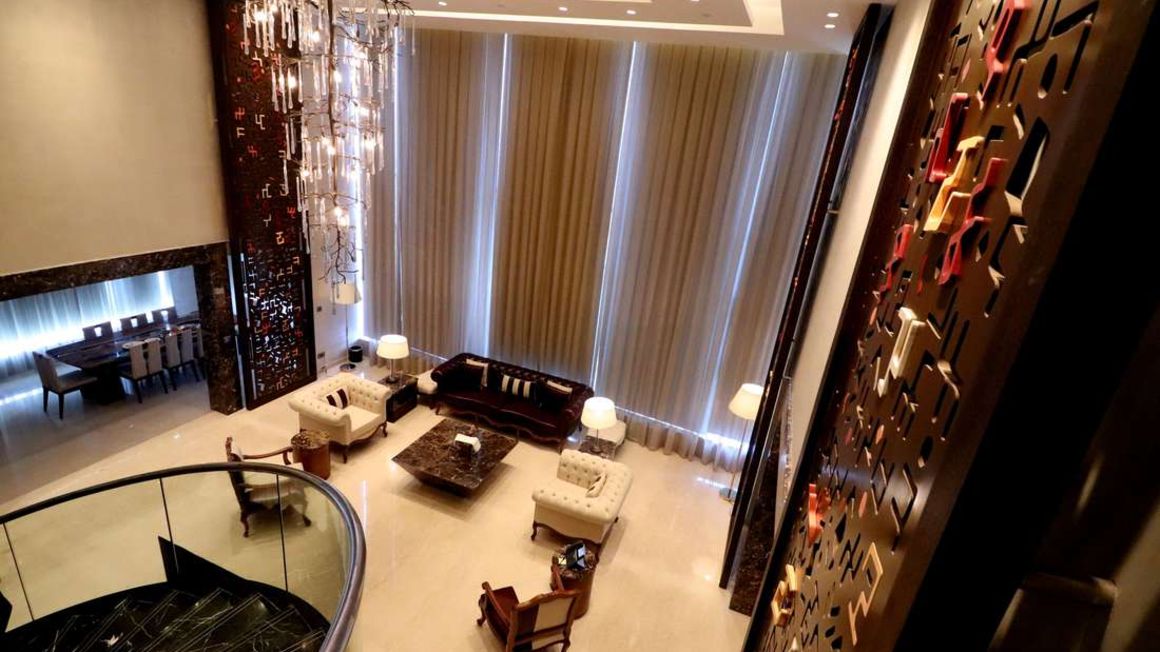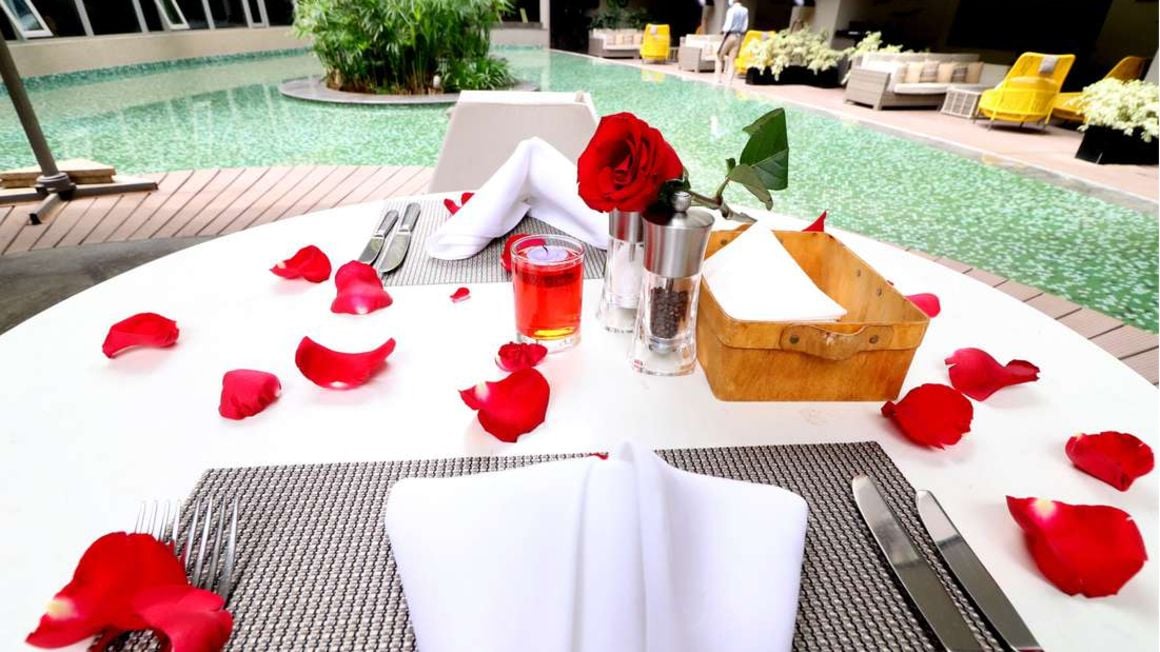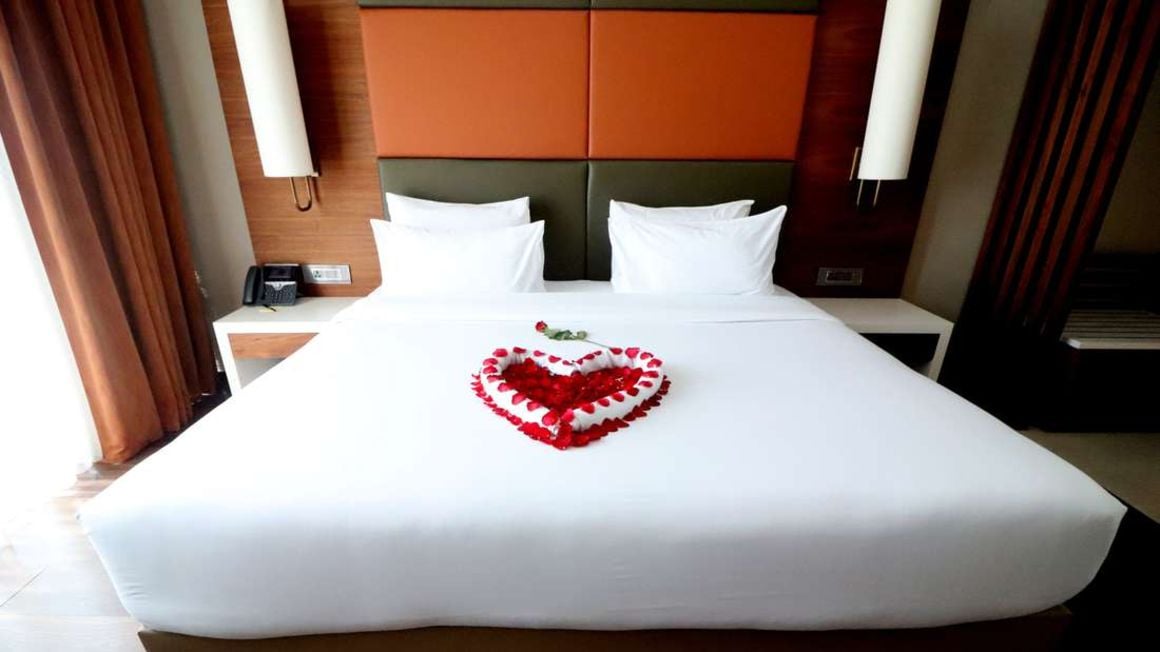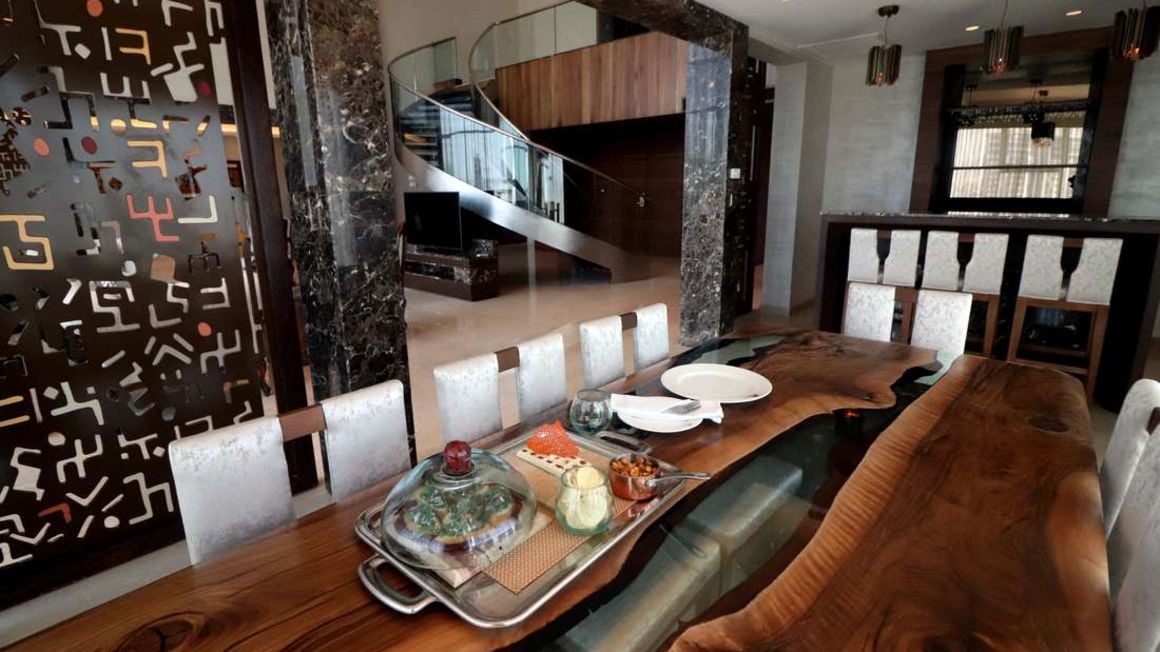
A hotel room at Ole Sereni. PHOTO | DIANA NGILA | NMG
Summary
- Luxury spending has been expected to be low, but high-end hotels and restaurants are seeing a rise in bookings.
- High-end consumer goods and services are seemingly proving resilient this Valentine’s Day, despite the Covid-19 pandemic as more plan to spend on restaurants and spas, luxury handbags, fine jewellery, or cashmere sweaters.
- At the Villa Rosa Kempinski in Nairobi, Judy Matengo, the Director of Sales says the presidential suite which goes for Sh1.5 million a night has already been booked.
Who would pay Sh1.5 million or Sh350,000 for a hotel room to celebrate Valentine’s Day in a pandemic? Well, a few wealthy Kenyans who want to mark the day with generosity that their romantic relationships can last.
Luxury spending has been expected to be low, but high-end hotels and restaurants are seeing a rise in bookings. High-end consumer goods and services are seemingly proving resilient this Valentine’s Day, despite the Covid-19 pandemic as more plan to spend on restaurants and spas, luxury handbags, fine jewellery, or cashmere sweaters.
At the Villa Rosa Kempinski in Nairobi, Judy Matengo, the Director of Sales says the presidential suite which goes for Sh1.5 million a night has already been booked.
“What we’re doing now is making the final touches,” says Ms Matengo.
Demand for the room has always been high, owing to exclusivity and exquisite furnishings and this year, even in an economic downturn, it is no different.
“The guest booked it weeks in advance. Being the only room of its kind, every guest afterward left disappointed, having missed out on it,” she adds.

A table set up at Radisson Blu - Arboretum for Valentine’s brunch, on February 9, 2021. PHOTO | DIANA NGILA | NMG
Besides the hotel room, Villa Rosa’s spa rooms have been busy.
“The spa has been extremely busy. Self-care spending has increased and a change of environment is good for one’s soul,” says Ms Matengo, adding that lunch and dinner reservations now stand at 60 and 70 percent respectively.
The picture is not so gloomy considering that the hotel industry was the worst hit during last year’s lockdown and closure of borders, that high-end restaurants moved their molecular gastronomy techniques to the back burner, switching to simple takeout dishes and home deliveries to stay afloat.
At Ole Sereni Hotel in Nairobi, the staff are also sprucing up the presidential suite which goes for Sh383,300 ($3,500) per night on Valentine’s Day. It is the exquisitely design with handmade Henry the 16th furniture imported from Italy, and with a view of the Nairobi National Park, that is appealing to couples.

“Valentine’s Day is a hallmark day especially this time because it’s an opportunity for lovers to show each other that no matter what may come, their love will stand. It is a chance to celebrate their love weathering the pandemic storm,” says Ghulam Samdani, the Group CEO of Ole Sereni.
Like most hotels, they are betting on couples looking to book staycations, lunches and dinners. One of the day’s offerings — Lunch at the Sky Lounge — is already fully booked.
“It’s popular for those who want to have a day out with good food, great entertainment and love in the air,” he says, adding that staycations will be booked last minute. “It’s just how it works.”
Different strategy
Radisson Blue Hotel and Residence Nairobi Arboretum also expects brisk business during this Valentine’s weekend.
Theirs is a different strategy. Instead of marketing the lunches and dinners exclusively for couples, they have included the children in Valentine’s deals to woo more families.
Randy Ngala, the marketing and communications manager of Radisson Arboretum argues that children deserve love and a change of scenery too.
The hotel perhaps bore the biggest brunt having opened in 2019 right before the pandemic hit. Designed with one and two-bedroom self-catering apartments, the hotel survived on hosting customers attending baby and bridal showers, and small Covid-19 weddings.
“We had between two to three weddings per month. Such activities are what kept us afloat,” Mr Ngala says.
“Celebration is a big part of our culture. People are still looking to shake off the cabin fever. Therefore, this Valentine’s will be no different,” he adds. The intimate couple’s only dinner is restricted to only 60 couples compared to 150 pre-Covid.
So far, 60 percent of the dinner seats have been reserved.
He is optimistic about getting last-minute staycation guests streaming in on the D-day, given the experience he had last year.
“The apartments are fully furnished. All one needs to come with is a change of clothes. You can cook for yourself. If not, you can join us for Valentine’s dinner,” says Mr Ngala.
Yves Rocher, a cosmetics and beauty company, has also adopted a different strategy. It is targeting women looking to buy themselves a Valentine’s gift.
“We want women to love and treat themselves this season. Our new perfume, the Mon Rouge, is a perfect gift to get yourself. It is captivating,” says Maryanne Muigai, the Yves Rocher brand manager in Kenya.
During lockdown, she says they noticed that demand shifted to skin care products.
“Because of staying at home, women took time to pamper their skin. Demand for face masks, scrubs and cleansers was high,” she adds.
Different Valentine’s
Last year at a time like this, people bought flowers, chocolates and had dinner dates to celebrate Valentine’s Day, without keeping a distance or wearing a mask.
But now masks are mandatory and many couples will be booking hotels where they are unlikely to come into contact with another human—except for chefs and butlers.

And this kind of luxury comes at a high price, but it is worth it. “You get your limousine driver to pick you up from home, a private butler, chef, an entertainer of your choice. Access to the room is via a private lift, reducing Covid-19 risks,” Ms Matengo of Villa Rosa Kempinski says of what will accompany the Sh1.5 million Valentine’s Day deal.
In May 2020, when Covid-19 was perhaps at its peak, the average bed occupancy rate at Villa Rosa Kempinski stood at 10 percent. By September, it had improved to 24 percent as restrictions eased.
“Then we started getting guests from countries such Turkey, Russia and Dubai,” she says.
To keep the guest numbers up, they introduced the ‘white-glove services’ to instill confidence in their clients that the hotel is super clean. For those opting for spa treatments, they can ask their masseuse to wear gloves during a massage.
For Ole Sereni, they say this Valentine’s is different because they have had to mix it with the three Covid-19 safety measures: masks, social distancing and hygiene.
Besides having designated ‘no food’ areas, the hotel will have a food and drinks section and each area assigned specific staff, who in most cases stay at the hotel to avoid outside interactions and limit risks of getting coronavirus.
But why are hoteliers so positive about good business on Valentine’s Day?
Mr Samdhani, a Swiss-trained hospitality specialist, is basing his prospects on what he witnessed during the 2020 Christmas holidays. For the first time, Nairobi was not quiet. With overseas destinations unavailable due to the risks involved and travel restrictions, most people stayed in the city for Christmas.
Also, the year was one with reduced expenses thus people were able to save quite a bit of money and they turned up in high-end restaurants in droves.
“I expect the same this Valentine’s. Our clients have enough disposable income. What they’re looking for, are reasons to spend. Give them value for their money and they’ll be ready to spend,” he says, adding that compared to Kenyans, Ugandans are lavish spenders.
Mr Ngala adds that today’s hotel clientele has evolved and with that their hierarchy of needs.
“They want experience, value, convenience, price, in that order,” he says.
The Mastercard Love Index, an annual statistic released by Mastercard on last Valentine’s Day, supports this. It shows that Kenyans are keeping pace with global trends and favouring experiences over traditional gifts. The amount they spent on restaurants increased by 18 percent in 2019, against a 16 percent rise globally. The index showed that the global “love economy” grew five times faster than the regular economy two years ago. Romanians were some of the most generous lovers in the world.
“Valentine’s 2021 is a day for people to elevate their romance. If you guarantee a memorable experience, Kenyans will have no problem paying for it,” Mr Ngala says.




No comments :
Post a Comment